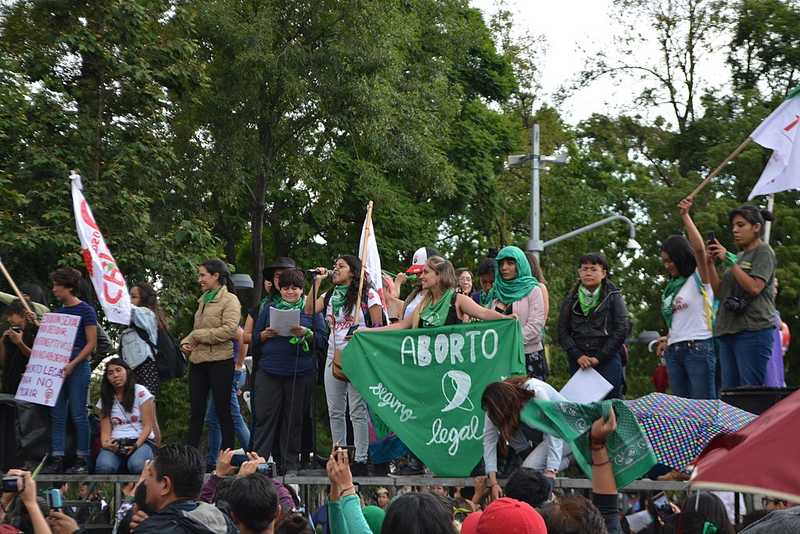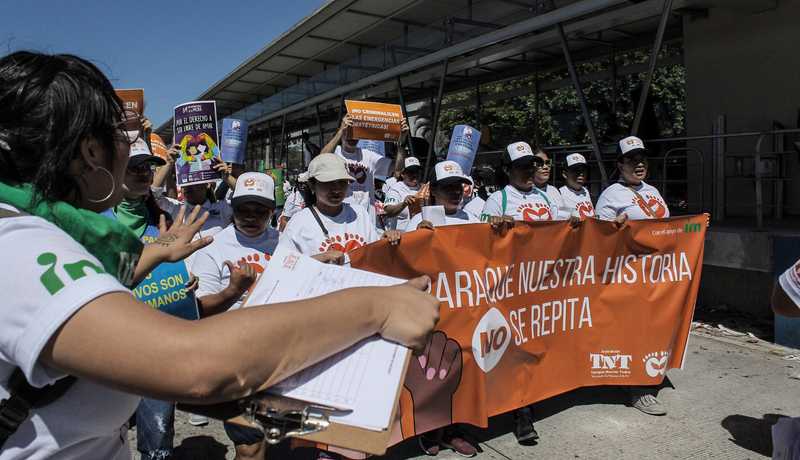
Crystal, an abortion acompañante from Mexico, has a green bandana attached to her backpack that signals her involvement in the marea verde, the “green wave” of reproductive rights activism gaining momentum throughout Latin America. In her bag she carries pamphlets from the Tijuana Safe Abortion Network and Las Bloodys, the feminist collective she helped found. Designed to fold up into a neat rectangle that slips discreetly into a back pocket, the pamphlets provide details for how to self-administer an abortion safely, avoiding legal and medical risks.
On September 7, 2021, Mexico’s Supreme Court decriminalized abortion, which until last month was illegal in the state of Baja California, where Crystal lives, and in much of the rest of the country. The recent ruling will eventually allow increased access to abortion care and free the women imprisoned under prior laws, often just for being suspected of intentionally terminating a pregnancy. But it will take some time for the ruling to take effect throughout Mexico’s thirty-two states, especially the seventeen that have constitutional amendments that declare that life starts at conception. And though the ruling protects abortion-seekers from being prosecuted, it does not guarantee universal access. While the reproductive rights movement in Mexico has been waiting for this decision for a long time, “nothing much will change for us,” Crystal told me after the news broke. “Legalization has never been our end goal.”
“Our work won’t stop until abortion is free,” she continued. “Queremos el aborto libre.” Crystal clarified that aborto libre didn’t just mean free of charge; it also means free as in liberated, free from stigma, free from medicalized control and legal restrictions, free for pregnant people to make the best decision for themselves. In the years leading up to the September decision, collectives of acompañantes like Las Bloodys, Las Confidentas, and Las Libres provided emotional, logistical, and even medical support to people seeking abortions. This informal network is redefining the struggle for reproductive justice.
While abortion was being decriminalized in Mexico, advocates north of the border were dealing with devastating setbacks: Texas’s Senate Bill 8, which severely restricts abortion access in the state, and the Supreme Court’s announcement that it would hear arguments on Mississippi’s ban on abortion after fifteen weeks of pregnancy—a direct challenge to Roe v. Wade. In this difficult moment, the acompañantes movement in Mexico can teach U.S. activists about grassroots mobilizing where restricted access is the norm. Their flexible and holistic model of abortion care anticipates the limits of state health services and the formal medical establishment. Now is the time to revive cross-border solidarity networks and deepen a transnational reproductive justice movement that centers bodily autonomy and diverse, dignified options for pregnant people.
Snacks and Slippers for All
Before the September ruling, acompañantes often worked at the margins of the law to bridge the gaps in Mexico’s uneven landscape of reproductive rights. With support from Mexico’s feminist and reproductive rights organizations, they connected people to formal medical and legal resources and funded travel to Mexico City and the other few places where abortion was legal. While acompañantes helped bring people to clinics, they found that many preferred instead to self-administer abortions using misoprostol, or “miso,” an ulcer drug and effective abortifacient that is available over the counter in Mexico. While data is hard to come by, an estimated 30 percent of abortions in Mexico are induced using miso. One of the many roles of the acompañante, then, is to help minimize the risks involved in self-managed abortions.
Many collectives encourage people to get ultrasounds at clinics and send the results to allied medical professionals to confirm the success of a self-administered abortion. Most collectives also recommend taking miso orally instead of vaginally, to reduce the possibility of an unsympathetic medical provider finding residual evidence. Without physical proof or a confession, people can claim that a planned abortion was a spontaneously occurring miscarriage.
While the recent Supreme Court ruling reduces the legal risks that acompañantes and abortion-seekers face, it doesn’t mean an end to the work of grassroots feminist collectives. Even if there were a legal guarantee of free abortion care, “we still see an important role for acompañantes,” Natalia, a member of Las Confidentas, said. “Our ultimate goal is to destigmatize and abolish obstetric violence. Even when this is achieved, people will likely still want people to accompany them, to make sure they’re receiving the kind of emotional support that even the fanciest clinics may not be able to provide.”
Some of the “fancy” clinics—the private practices in Mexico City that offer legal abortions until the twelfth week of pregnancy—have tiered packages of care. An in-clinic surgical procedure costs around $200 USD; anesthesia costs extra. For an additional $100, you can get snacks, slippers, and a private room to recuperate in. For someone earning Mexico’s minimum wage of $7 a day, these are unaffordable luxuries. “We’re working to bring about a world where everyone can have snacks and slippers with their abortion,” Marina, another member of Las Confidentas, remarked.
Acompañantes often host people at their homes to provide a safe place for self-administering abortion pills. “For zero pesos you can come to my house, and I’ll make sure you’re comfortable, that you have snacks, a hot water bottle, and Netflix,” Marina laughed. Then she grew more serious: “It’s ridiculous. How is it that only the rich have access to this kind of support?”
Beyond Roe
Before the Supreme Court’s Roe v. Wade ruling in 1973, the U.S. abortion landscape looked more like Mexico’s before September 7: while there was no guaranteed access, a robust activist network helped to provide abortion care. Several acompañantes mentioned taking inspiration from underground movements and feminist networks in the United States. Marina referred to the Jane Collective, a group of activists in Chicago with an anonymous hotline that connected pregnant people to abortion services and trained non-medical professionals to perform them. Silvia, an acompañante from Mexicali, recalled receiving training in the 1970s through a binational solidarity network that taught activists from both sides of the border to perform surgical abortions, a method that’s become less common with the advent and availability of abortion medications.
While many of these underground transnational solidarity groups disappeared after Roe, there are still networks of activists supporting abortion access in the United States by connecting people to resources and diverse types of care. Especially for women of color and people in low-income and conservative areas, legalization never meant the end of grassroots organizing and mobilizing efforts, largely because Roe never delivered the universal aborto libre that people sometimes think it did.
Organizations headed by Black and brown activists, like the Georgia-based SisterSong Women of Color Reproductive Justice Collective, have worked to broaden how U.S. reproductive rights advocates conceive of the struggle for bodily autonomy and the right to choose. In Reproductive Justice: An Introduction, scholar-activists Rickie Solinger and Loretta Ross explain “reproductive justice” as the recognition of the “human right to maintain personal bodily autonomy, have children, not have children, and parent the children we have in safe and sustainable communities.” Mexican abortion activists and prominent reproductive rights organizations also embrace the language of reproductive justice. Nonprofits like GIRE draw connections to the struggles of domestic workers and frame reproductive justice as a call for more robust social and economic rights, including increased access to parental leave and other forms of support for people who choose to be parents.
Through training and advocacy, SisterSong and other activist organizations foster informal networks of volunteers to support pregnant people economically, logistically, and emotionally. Growing numbers of radical and full-spectrum doula collectives of non-medically trained care workers are finding ways to assist people through all potential stages of a pregnancy—pre-conception, birth, abortion, post-partum, and beyond. In California, New York, Kentucky, Texas, and other states, these groups are bringing attention to the racial and economic disparities in reproductive care.
Accompanied Self-Managed Abortions
Misoprostol has been used as an abortifacient since the 1980s. The most common medical abortion regimen today is a combination of misoprostol with mifepristone, or “mife,” as the acompañantes refer to it. Mife/miso is 98 percent effective before sixty days of gestation, while miso alone in the first gestational phase is less effective, with a 75 to 85 percent chance of terminating a pregnancy. Acompañantes prefer to use the combination, but mife is not available over the counter, so most acompañantes provide abortion-seekers with only miso.
While self-induced abortions have become safer in the decades since abortifacients first came on the market, the legal risks have remained in place. In both Mexico and the United States, people have been prosecuted for performing at-home abortions without prescriptions. In 2015, a woman in Indiana was charged with fetal homicide for taking abortion-inducing drugs; twenty-eight states have fetal homicide laws like Indiana’s. In Mexico, people even suspected of seeking abortions could get up to six years of jail time. According to figures from GIRE, there have been around 500 abortion criminal investigations per year since 2015. Ninety-eight of these cases resulted in convictions. With Mexico’s Supreme Court ruling in September, being suspected of having an abortion will no longer be criminalized in this way.
Advocates for self-managed care on both sides of the border want legislation that allows people to choose the abortion procedure that best suits them. In the meantime, global nonprofits such as Women Help Women provide resources with detailed instructions for how to safely self-administer an abortion anywhere in the world.
Illegal Doesn’t Have to Mean Unsafe
Reproductive rights activists often emphasize the lengths that people will go to when they’ve decided to terminate a pregnancy, and the deaths caused when services aren’t legal. The Roe ruling in 1973 was followed by a rapid drop in maternal deaths, showing how important legalization is to increasing access to safe care. But these narratives can also reinforce a stigma against self-managed care and minimize the financial, emotional, and other forms of support a pregnant person might need. Advocates for radical abortion care make the case that not all illegal self-managed abortions are inherently unsafe—and that they can expand access dramatically. The importance of centering care on the pregnant person’s needs and preferences over the authority of a doctor or the government is one of the many important lessons that can be learned from the work of Mexican activists.
Crystal is emboldened by Mexico’s Supreme Court decision but also wants the global reproductive justice movement to think beyond legal barriers and battles. “The legal struggle is an important one, but it’s not the only pathway to attaining el aborto libre,” she said. The news from Texas confirmed Crystal’s belief that more radical visions of reproductive justice are needed. “I’m working toward a world where we all possess the herbal and medical knowledge to handle a pregnancy how we want to and access the resources that we alone know we need.”
Crystal's message to reproductive activists in the United States is not to let legal battles get in the way of imagining alternative ways of caring for each other and ourselves. "Women have always found a way and we will continue to. Decriminalized, legalized, it doesn’t matter. We’re here for you, we’ll send you pills in the mail, we’ll walk you through our tactics. Whatever you need.” she said.
Zoé VanGelder is a member of the En Nepantla transnational storytelling collective and a scholar-activist pursuing her PhD in anthropology at Stanford University.
Photo: ProtoplasmaKid / Wikimedia Commons





